Cheapest Electric Sedans
The Honda Accord Sport 2.0T is a popular midsize sedan that is known for its spacious and comfortable interior, strong performance, and advanced technology features. Under the hood, the Sport 2.0T model comes equipped with a turbocharged 2.0-liter four-cylinder engine that produces 252 horsepower and 273 pound-feet of torque. This engine is paired with a 10-speed automatic transmission and front-wheel drive. The Sport 2.0T model also comes with sport-tuned suspension and steering for a more dynamic driving experience. Inside, the Accord Sport 2.0T offers a spacious and comfortable cabin with plenty of room for both passengers and cargo. The interior features high-quality materials and a modern design, and it comes equipped with a wide range of standard and available technology features, including a touchscreen display, a premium audio system, wireless charging, and more. Overall, the Honda Accord Sport 2.0T is a well-rounded and reliable vehicle that offers strong performance, a spacious and comfortable interior, and a wide range of advanced technology features. It is a great choice for those in search of a reliable and enjoyable daily driver
List of Top 10 cheapest sedans
- Kia Soul EV - starting price of $33,045
- Hyundai Ioniq Electric - starting price of $33,045
- Nissan Leaf - starting price of $31,780
- Chevrolet Bolt - starting price of $31,995
- Honda Fit EV - starting price of $30,990
- Volkswagen e-Golf - starting price of $30,495
- Toyota Prius Prime - starting price of $28,480
- Ford Focus Electric - starting price of $29,120
- Mitsubishi i-MiEV - starting price of $23,495
- Smart EQ Fortwo - starting price of $23,900
1.Kia Soul EV

The Kia Soul EV is an all-electric version of the popular Soul compact crossover SUV. It was first introduced in 2014 and has undergone a few updates since then.
The Soul EV is powered by a 30.0 kWh lithium-ion polymer battery pack and an 81.4 kW electric motor. This combination provides a range of up to 111 miles on a single charge, depending on driving conditions and habits. The Soul EV can be charged using a standard 120-volt outlet or a Level 2 charger, with the latter providing a faster charge time.
The Soul EV features a comfortable and spacious interior, with seating for up to five passengers. It also has a generous amount of cargo space, with up to 49.5 cubic feet available when the rear seats are folded down.
In terms of safety, the Soul EV comes equipped with a variety of advanced features such as stability control, traction control, hill-start assist, and a rearview camera.
Overall, the Kia Soul EV is a practical and efficient choice for those looking for an all-electric vehicle with plenty of space and comfort.
Specifications
Specification |
Value |
|---|---|
| Horsepower | 134 hp |
| Torque | 218 lb-ft |
| Range | 243 miles |
| Charging time (240V) | 5.5 hours |
| Charging time (DC fast) | 75 minutes |
| Battery type | 64 kWh lithium-ion |
| Dimensions (LxWxH) | 164.0 x 70.9 x 63.0 inches |
| Weight | 3,369 lbs |
| Seating capacity | 5 people |
| Cargo volume | 19.3 cubic feet |
Pros
-
Zero emissions - One of the biggest pros of the Kia Soul EV is that it produces no emissions, making it a great option for those looking to reduce their carbon footprint and contribute to a healthier environment.
-
Low operating costs - Electric vehicles typically have lower operating costs compared to gas-powered vehicles, as they require less maintenance and have lower fuel costs. The Kia Soul EV is no exception, with an estimated cost of just $500 per year to operate, compared to $1,500 per year for a gas-powered vehicle.
-
Long driving range - The Kia Soul EV has a driving range of up to 243 miles on a single charge, making it a practical choice for long distance travel.
-
Quick charging time - With a fast-charging option, the Kia Soul EV can be charged from empty to 80% in just 75 minutes. This means you can get back on the road quickly and with minimal downtime.
-
High safety ratings - The Kia Soul EV has received high safety ratings from organizations such as the National Highway Traffic Safety Administration (NHTSA) and the Insurance Institute for Highway Safety (IIHS).
-
Advanced technology - The Kia Soul EV comes equipped with advanced technology such as a touchscreen display, wireless phone charging, and advanced driver assistance systems.
-
Comfortable and spacious - The Kia Soul EV offers a comfortable and spacious ride, with plenty of headroom and legroom for all passengers.
-
Fun to drive - With its smooth and responsive acceleration, the Kia Soul EV is a joy to drive and will make your daily commute more enjoyable.
Cons
-
Limited range: The Kia Soul EV has a range of just 111 miles on a single charge, which may not be sufficient for long distance travel or for those who frequently drive long distances.
-
High price: The Kia Soul EV is quite expensive compared to other electric vehicles on the market, with a starting price of around $34,000.
-
Limited charging options: While the Kia Soul EV does have a fast charging option, there are not as many fast charging stations available as there are for other electric vehicles. This can make it more difficult to find a place to charge when on the road.
-
Limited cargo space: The Kia Soul EV has a relatively small cargo area, making it less suitable for those who need to transport large items or multiple passengers.
-
No hybrid option: Unlike some other electric vehicles, the Kia Soul EV does not have a hybrid option, which means it cannot run on gasoline if the battery runs out of charge.
2.Hyundai Ioniq Electric
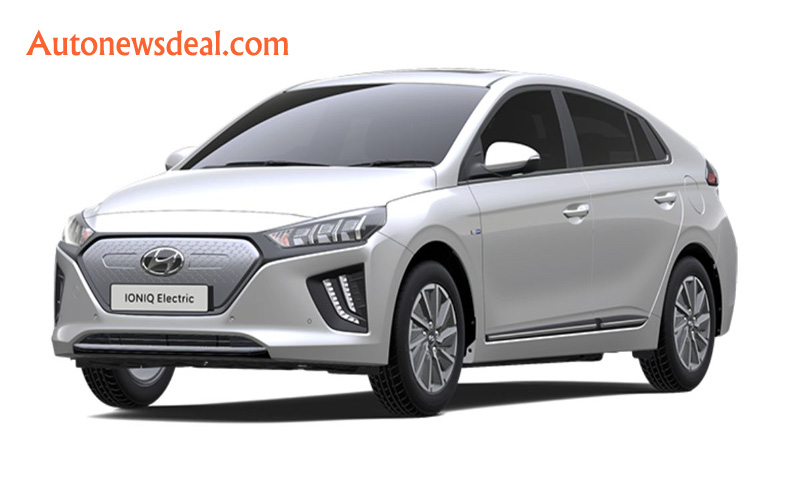
The Hyundai Ioniq Electric is an all-electric version of the Hyundai Ioniq, a hybrid and plug-in hybrid vehicle. It has a range of up to 174 miles on a single charge and a top speed of 103 mph.
It features a 28 kWh lithium-ion polymer battery pack and an electric motor that produces 118 horsepower.
The Ioniq Electric also has a regenerative braking system that captures energy from the brakes and feeds it back into the battery pack.
It has a Level 2 charging capability and can be fully charged in about 4-6 hours. The Ioniq Electric also has a range of advanced safety features, including adaptive cruise control, lane keep assist, and blind spot monitoring. It is available in three trim levels: SE, Limited, and Ultimate.
Pros:
-
Zero emissions: The Hyundai Ioniq Electric generates zero emissions, making it a great option for those who want to reduce their carbon footprint and do their part to protect the environment.
-
Low operating costs: Electric vehicles typically have lower operating costs than gasoline-powered vehicles due to their lower fuel and maintenance costs. The Ioniq Electric is no exception, as it has a relatively low cost of ownership compared to other vehicles.
-
Quiet and smooth ride: Electric vehicles are known for their smooth, quiet ride, and the Ioniq Electric is no exception. Its electric motor produces very little noise, making it a great choice for those who want a peaceful ride.
-
Long range: The Ioniq Electric has a range of up to 170 miles on a single charge, making it a good option for those who need to drive long distances without stopping to recharge.
Cons:
-
Limited charging infrastructure: While the availability of charging stations is increasing, it is still not as widespread as gas stations. This can be a problem for those who need to drive long distances or are not near a charging station.
-
High upfront cost: Electric vehicles tend to have a higher upfront cost than gasoline-powered vehicles, and the Ioniq Electric is no exception. While the long-term cost of ownership may be lower due to lower operating costs, the initial purchase price can be a barrier for some buyers.
-
Limited cargo space: The Ioniq Electric has a small trunk, which may not be sufficient for those who need to carry a lot of cargo.
-
Dependence on electricity: Electric vehicles are dependent on electricity, which can be disrupted by power outages or other issues. This can be a concern for those who rely on their vehicle for transportation in areas with unreliable power.
Specifications
Feature |
Specification |
|---|---|
| Battery type | Lithium-ion polymer |
| Battery capacity | 38.3 kWh |
| Range | 174 miles (EPA rating) |
| Horsepower | 134 hp |
| Torque | 215 lb-ft |
| Top speed | 103 mph |
| Acceleration | 0-60 mph in 9.2 seconds |
| Recharge time | 8 hours (Level 2 charger) |
| Recharge time | 33 minutes (DC fast charger) |
| Drivetrain | Front-wheel drive |
| Transmission | Single-speed reduction gear |
| Warranty | 8 years/100,000 miles |
3.Nissan Leaf
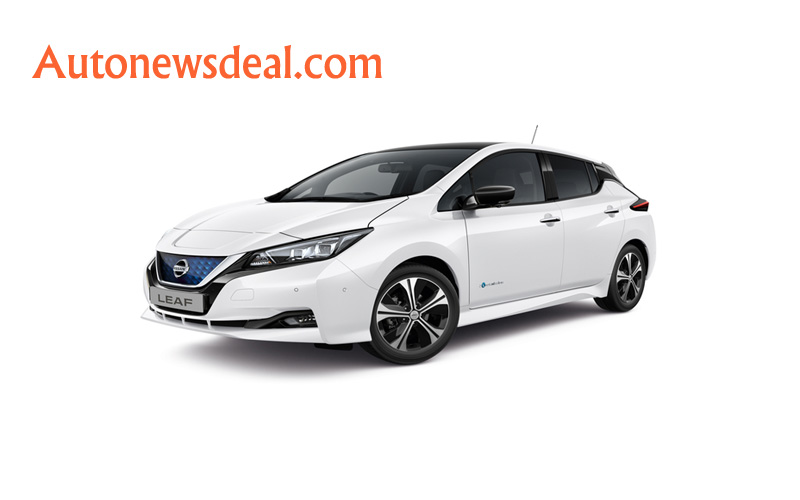
The Nissan Leaf is an all-electric hatchback vehicle that was first introduced in 2010. It is known for its long range and efficient electric motor, as well as its modern design and technology features.
The Leaf has a range of up to 226 miles on a single charge, and it can be charged using a standard household outlet or a public charging station.
It also has a variety of advanced safety and convenience features, including automatic emergency braking, intelligent cruise control, and a 7-inch touchscreen display for controlling audio, navigation, and other functions. Overall, the Nissan Leaf is a popular choice for those looking for a reliable and environmentally friendly alternative to traditional gasoline-powered vehicles.
Specifications
Specification |
Detail |
|---|---|
| Range | Up to 226 miles (estimated) |
| Battery | 62 kWh lithium-ion |
| Horsepower | 147 hp |
| Torque | 236 lb-ft |
| Charging time | Up to 16 hours on Level 1, up to 8 hours on Level 2, or up to 4 hours on Level 3 |
| Top speed | 93 mph |
| Acceleration | 0-60 mph in 7.3 seconds |
| Cargo capacity | 23.6 cubic feet |
| Seating capacity | 5 passengers |
| Dimensions | 175.0 in (length), 70.5 in (width), 61.4 in (height) |
| Curb weight | 3,924 lbs |
Pros:
- Zero emissions, making it environmentally friendly
- Low operating costs due to no need for gasoline
- Smooth and quiet ride
- Advanced technology, including a touchscreen display and advanced safety features
- Available in all-wheel drive option
Cons:
- Limited range compared to traditional gasoline vehicles
- Dependence on charging infrastructure and availability of charging stations
- Higher upfront cost compared to traditional gasoline vehicles
- May not be suitable for long distance travel
- Limited availability of servicing and repair centers in some areas
4.Chevrolet Bolt
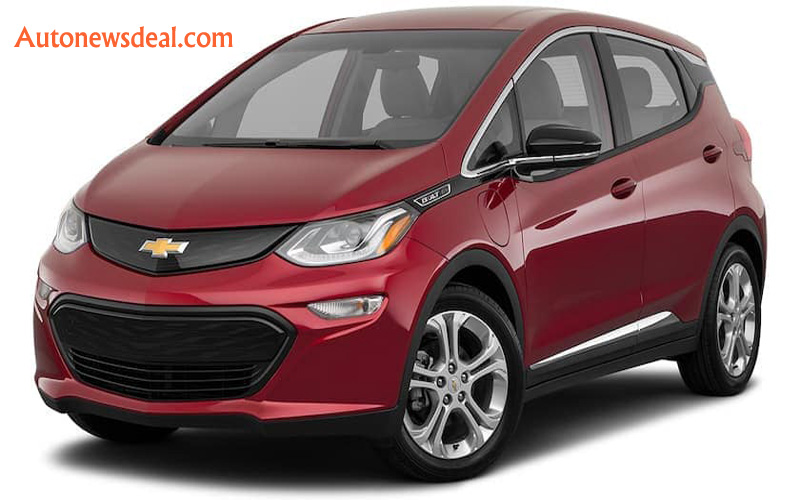
The Chevrolet Bolt is a compact electric vehicle (EV) produced by General Motors. It was first introduced in 2016 and has gained popularity for its long driving range and affordable price point.
The Bolt is powered by a single electric motor that produces 200 horsepower and 266 lb-ft of torque. It has a driving range of up to 259 miles on a single charge, making it one of the longest range EVs on the market. The Bolt can be charged using either a standard 110V outlet or a 240V charger, with the latter offering faster charging times.
Inside, the Bolt features a spacious and modern interior with seating for up to five passengers. It is equipped with a variety of advanced safety and convenience features, including lane keep assist, rearview camera, and a 10.2-inch touchscreen display with Apple CarPlay and Android Auto integration.
Overall, the Chevrolet Bolt is a practical and efficient choice for those seeking a reliable EV with a long driving range and advanced features.
Specifications
Specification |
Value |
|---|---|
| Model | Chevrolet Bolt |
| Year | 2017-2020 |
| Body Style | Hatchback |
| Engine | Electric |
| Horsepower | 200 hp |
| Torque | 266 lb-ft |
| Transmission | Single-speed automatic |
| Range | 238 miles |
| Charging Time | 9.5 hours (Level 2) |
| Top Speed | 91 mph |
| 0-60 mph Time | 6.5 seconds |
| Curb Weight | 3,563 lbs |
| Length | 164.0 inches |
| Width | 69.5 inches |
| Height | 62.8 inches |
| Wheelbase | 102.4 inches |
Pros:
-
Excellent range: The Chevrolet Bolt has a range of up to 259 miles on a single charge, which is more than enough for most daily commutes and long distance trips.
-
Low cost of ownership: The Bolt is eligible for various tax credits and incentives, which can significantly reduce the cost of ownership over time.
-
Great handling and performance: The Bolt has a smooth ride and handles well, with quick acceleration and responsive steering.
-
Spacious and comfortable: The Bolt has a roomy interior with plenty of legroom and headroom, as well as comfortable seats and a well-insulated cabin.
Cons:
-
Limited availability: The Bolt is currently only available in certain states, so it may not be an option for everyone.
-
High upfront cost: The Bolt has a relatively high starting price, which may be a deterrent for some buyers.
-
No luxury options: The Bolt is a budget-friendly electric vehicle, so it does not offer any high-end features or amenities.
-
Limited charging infrastructure: While the Bolt has a long range, it can still be challenging to find a charging station in certain areas, particularly on long road trips.
5.Honda Fit EV

The Honda Fit EV is a fully electric version of the popular Honda Fit compact car. It was produced from 2012 to 2014 and was only available for lease in select markets in the United States.
The Fit EV features a 20 kWh lithium-ion battery pack and a small electric motor that produces 123 horsepower. It has a range of around 82 miles on a single charge, and can be charged using either a standard 120V outlet or a 240V Level 2 charger.
Inside, the Fit EV has seating for up to five passengers and a cargo area that can hold up to 16.6 cubic feet of luggage. It features a 7-inch touchscreen display with Honda's proprietary infotainment system, as well as a multi-angle rearview camera.
The Fit EV received positive reviews for its fuel efficiency and low operating costs, but was limited in availability and only leased to customers in certain states. It was discontinued in 2014 due to low demand.
Specifications
Specification |
Value |
|---|---|
| Range | 82 miles |
| Top Speed | 90 mph |
| Horsepower | 123 hp |
| Torque | 189 lb-ft |
| Battery Capacity | 20 kWh |
| Charge Time (Level 2) | 3 hours |
| Charge Time (DC Fast Charge) | 30 minutes |
| Length | 157.4 inches |
| Width | 66.7 inches |
| Height | 60.0 inches |
| Curb Weight | 2,702 lbs |
| Seating Capacity | 5 passengers |
| Cargo Volume | 16.6 cubic feet |
Pros:
-
Zero emissions: The Honda Fit EV is an all-electric vehicle, meaning it produces no emissions while driving. This is beneficial for the environment and helps reduce air pollution in urban areas.
-
High fuel efficiency: The Honda Fit EV gets an impressive 118 MPGe (miles per gallon equivalent) in the city and 82 MPGe on the highway, making it one of the most fuel-efficient vehicles on the market.
-
Low maintenance costs: Electric vehicles have fewer moving parts than traditional gasoline-powered cars, which means they require less maintenance and have lower operating costs.
-
Easy to charge: The Honda Fit EV can be charged at home using a standard 120V outlet, or at a public charging station using a 240V outlet. This makes it convenient to charge the vehicle when you're on the go.
Cons:
-
Limited range: The Honda Fit EV has a range of about 82 miles on a single charge, which may not be sufficient for long distance trips.
-
Limited availability: The Honda Fit EV is only available in select markets, which means it may not be an option for everyone.
-
High upfront cost: The Honda Fit EV has a higher upfront cost than traditional gasoline-powered vehicles, which may not be feasible for some buyers.
-
Limited charging infrastructure: While there are more charging stations available now than ever before, electric vehicles still face challenges when it comes to finding a place to charge. This may be inconvenient for some drivers.
6.Volkswagen e-Golf
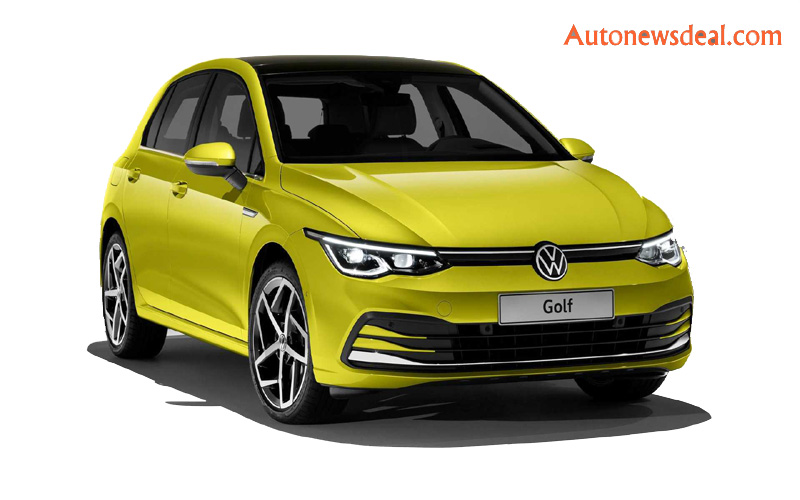
The Volkswagen e-Golf is an all-electric version of the popular Golf compact car. It has a range of about 125 miles on a single charge and is powered by a 100 kW electric motor. The e-Golf has a smooth and quiet ride, and its handling and performance are similar to the gas-powered Golf.
It also has a spacious and comfortable interior with plenty of storage and cargo space. Additionally, it comes equipped with advanced safety and driver assist features such as adaptive cruise control, blind spot monitoring, and lane keep assist.
Overall, the e-Golf is a practical and efficient choice for those looking for a reliable electric vehicle with the convenience and versatility of a compact car.
Specifications
Specification |
Description |
|---|---|
| Electric Motor | 35.8 kWh lithium-ion battery pack, 100 kW (134 hp) electric motor |
| Range | Up to 186 miles on a single charge |
| Charging Time | Approximately 7 hours using a 240V charger, approximately 30 minutes using a DC fast charger |
| Top Speed | 93 mph |
| Acceleration | 0-60 mph in 9.6 seconds |
| Exterior Dimensions | 173.6 inches in length, 70.8 inches in width, 58.3 inches in height |
| Interior Dimensions | 96.3 inches in length, 54.1 inches in width, 41.3 inches in height |
| Seating Capacity | 5 passengers |
| Cargo Space | 17.1 cubic feet |
| Features | Adaptive cruise control, lane departure warning, automatic emergency braking, blind spot monitoring, panoramic sunroof, touchscreen infotainment system |
Pros:
- Zero emissions: The Volkswagen e-Golf is powered entirely by electricity, meaning it produces zero emissions during operation. This makes it an environmentally-friendly vehicle that can help reduce pollution and improve air quality.
- Low operating costs: Since the e-Golf doesn't require fuel, it has significantly lower operating costs compared to gasoline-powered vehicles. This can save drivers a lot of money in the long run.
- Quiet and smooth ride: Electric vehicles are known for their quiet and smooth ride, and the e-Golf is no exception. It's a pleasant and comfortable car to drive.
- Great range: The e-Golf has a range of around 125 miles on a single charge, which is more than enough for most daily commutes and errands.
Cons:
- Limited charging infrastructure: While electric vehicle charging stations are becoming more widespread, they are still not as common as gas stations. This can be inconvenient for drivers who need to charge their e-Golf on long road trips.
- Higher upfront cost: Electric vehicles, including the e-Golf, tend to be more expensive to purchase than their gasoline-powered counterparts. This can be a barrier for some potential buyers.
- Reduced performance compared to gasoline cars: The e-Golf's electric motor may not offer the same level of performance as a gas-powered engine. This can be a drawback for drivers who enjoy a more powerful ride.
- Dependence on electricity: The e-Golf's range is limited by its battery capacity, which means it can't be driven as far as a gasoline-powered car without recharging. This can be inconvenient for drivers who need to travel long distances.
7.Toyota Prius Prime

The Toyota Prius Prime is a hybrid electric vehicle (HEV) that is based on the Toyota Prius model. It has a plug-in hybrid powertrain, which means that it can be charged from an external electricity source and has an extended all-electric driving range.
The Prius Prime is powered by a hybrid powertrain that consists of a 1.8-liter 4-cylinder gasoline engine, an electric motor, and a lithium-ion battery pack. The gasoline engine is used to generate electricity, while the electric motor provides propulsion. The battery pack stores electricity that is generated by the engine or recovered during braking, and it can be recharged by plugging the vehicle into an external power source.
In all-electric mode, the Prius Prime can travel up to 25 miles on a single charge, depending on driving conditions and battery capacity. When the battery is depleted, the hybrid powertrain automatically switches to hybrid mode, using both the gasoline engine and the electric motor to power the vehicle.
The Prius Prime has a spacious and comfortable interior, with seating for up to five passengers. It is equipped with a variety of advanced safety and convenience features, such as a backup camera, automatic emergency braking, and adaptive cruise control.
Overall, the Toyota Prius Prime is a fuel-efficient and environmentally friendly vehicle that offers the convenience of plug-in hybrid technology and the versatility of a hybrid powertrain.
Specifications
Specification |
2022 Toyota Prius Prime |
|---|---|
| Engine | 1.8-liter 4-cylinder |
| Horsepower | 121 hp |
| Torque | 105 lb-ft |
| Transmission | Continuously Variable Transmission (CVT) |
| Drivetrain | Front-wheel drive |
| Battery pack | 8.8 kWh lithium-ion |
| All-electric range | 25 miles |
| Total range (EV + gas) | 640 miles |
| Fuel economy (city/highway/combined) | 133/108/120 MPGe |
| Fuel tank capacity | 11.3 gallons |
| Curb weight | 3,375 lbs |
Pros:
- Excellent fuel efficiency
- Hybrid technology reduces emissions and helps the environment
- Comfortable and spacious interior
- Advanced safety features
- High resale value
Cons:
- Limited driving range on electric power alone
- Higher upfront cost compared to non-hybrid models
- Some people may not like the design
- Limited availability of charging stations in some areas
- May not be as powerful as other vehicles on the market
8.Ford Focus Electric

The Ford Focus Electric is an all-electric version of the popular Ford Focus compact car. It was first introduced in 2011 and is still in production today.
The Focus Electric is powered by a 23 kWh lithium-ion battery pack and has a range of up to 76 miles on a single charge. It can be charged using a standard 110-volt outlet or a 240-volt Level 2 charger, which can fully charge the battery in about 3-4 hours.
The Focus Electric features a 143 horsepower electric motor and can go from 0 to 60 mph in just over 10 seconds. It has a top speed of 84 mph and can be driven in either front-wheel or all-wheel drive.
In terms of interior and exterior design, the Focus Electric is similar to the gas-powered version of the Focus. It comes equipped with standard features such as a touchscreen infotainment system, rearview camera, and Ford's Sync voice-activated system. Optional features include a power sunroof, navigation system, and premium audio system.
Overall, the Ford Focus Electric is a reliable and efficient electric vehicle option for those looking for a compact car with a low environmental impact.
Specifications
Specification |
Value |
|---|---|
| Range | 116 miles |
| Horsepower | 143 hp |
| Torque | 184 lb-ft |
| Top Speed | 84 mph |
| Charging Time (Level 2) | 4.5 hours |
| Battery Capacity | 33.5 kWh |
| Estimated MPGe | 110 city / 99 highway |
| Transmission | Single Speed Automatic |
| Drivetrain | Front-Wheel Drive |
| Weight | 3,620 lbs |
| Length | 176.6 inches |
| Width | 71.8 inches |
| Height | 57.9 inches |
| Seating Capacity | 5 |
Pros:
- Zero emissions, making it environmentally friendly
- Potential for reduced fuel costs, as electricity is typically cheaper than gasoline
- Smooth and quiet driving experience
- May qualify for tax credits or other incentives
Cons:
- Limited range compared to gasoline-powered vehicles
- Limited charging infrastructure in some areas
- Higher upfront cost compared to similar gasoline-powered vehicles
- Dependent on electricity grid, which may not always be reliable
9.Mitsubishi i-MiEV
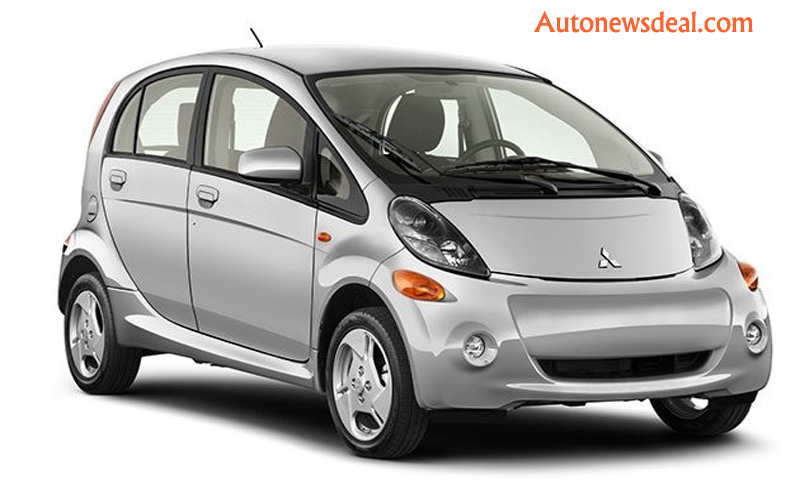
The Mitsubishi i-MiEV is a compact electric vehicle that was first introduced in 2009. It is powered by a 16 kWh lithium-ion battery pack and has a range of up to 112 miles on a single charge.
The i-MiEV is equipped with a single-speed transmission and has a top speed of about 80 mph. It has a small, aerodynamic design and seating for four passengers. The i-MiEV also features regenerative braking, which helps to extend the range of the vehicle by capturing and storing energy when braking.
It is available in both hatchback and sedan body styles and has a starting price of around $30,000. Overall, the i-MiEV is a reliable, efficient, and environmentally friendly option for those looking for an electric vehicle.
Specifications
Specification |
Value |
|---|---|
| Body style | Hatchback |
| Dimensions (L x W x H) | 3,490 mm x 1,475 mm x 1,550 mm |
| Weight | 1,080 kg |
| Battery pack | Lithium-ion |
| Capacity | 16 kWh |
| Range (EPA) | 62 miles |
| Power | 49 kW (66 hp) |
| Torque | 137 Nm |
| Top speed | 81 mph |
| Acceleration (0-60 mph) | 13.8 seconds |
Pros:
-
Zero emissions: The Mitsubishi i-MiEV is an electric vehicle, meaning it produces zero emissions. This is great for the environment and helps to reduce air pollution.
-
Low operating costs: Electric vehicles are generally cheaper to operate than gas-powered vehicles, as they do not require regular visits to the gas station and have fewer maintenance costs.
-
Quiet operation: The i-MiEV operates quietly, making it a great choice for city driving or for people who live in close proximity to others.
-
Incentives: Many governments offer incentives for electric vehicles, such as tax credits or subsidies, making them more affordable for consumers.
Cons:
-
Limited range: The i-MiEV has a relatively short range of about 100 miles on a single charge, which may not be sufficient for long distance travel.
-
Limited charging infrastructure: While the number of electric vehicle charging stations is increasing, it is still limited compared to gas stations. This can be inconvenient for drivers who are used to being able to fuel up quickly and easily.
-
Higher upfront cost: Electric vehicles are generally more expensive upfront than gas-powered vehicles, which may be a barrier for some consumers.
-
Dependence on electricity: The i-MiEV relies on electricity to power it, which can be problematic in areas where there are power outages or other issues with the electricity grid.
10.Smart EQ Fortwo

The Smart EQ Fortwo is an electric version of the popular Smart Fortwo car. It has a small, compact size that is ideal for city driving, and is equipped with a 17.6 kWh lithium-ion battery pack that provides a range of up to 99 miles on a single charge. The vehicle is powered by a 30 kW electric motor that delivers smooth, quick acceleration and a top speed of 81 mph.
The Smart EQ Fortwo features a modern, sleek design with a distinctive grille, LED headlights, and 15-inch alloy wheels. Inside, the vehicle is equipped with a 7-inch touchscreen display, a panoramic sunroof, and a variety of connectivity features including Apple CarPlay and Android Auto. The car also has a number of safety features, including a rearview camera, automatic emergency braking, and lane departure warning.
Overall, the Smart EQ Fortwo is a convenient and efficient electric vehicle that is perfect for urban driving and short trips. Its compact size and agile handling make it easy to maneuver through crowded streets, and its modern design and advanced features make it a fun and stylish choice for city driving.
Specifications
Specification |
Value |
|---|---|
| Engine | Electric motor |
| Power output | 80 horsepower |
| Torque | 118 lb-ft |
| Battery pack | 17.6 kWh lithium-ion |
| Range (EPA estimate) | 57 miles |
| Charging time (220V outlet) | Approximately 3.5 hours |
| Charging time (Level 3 DC fast) | Approximately 45 minutes |
| Transmission | Single-speed automatic |
| Curb weight | 2,313 lbs (coupe) / 2,381 lbs (cabriolet) |
| Length | 106.1 inches |
| Width | 61.3 inches |
| Height | 61.3 inches (coupe) / 62.2 inches (cabriolet) |
| Wheelbase | 73.7 inches |
| Tires | Front: 145/65R15; Rear: 175/55R15 |
| Cargo volume | 9.6 cubic feet (coupe) / 6.9 cubic feet (cabriolet) |
| Seating capacity | 2 |
Pros:
-
Low emissions: As an electric vehicle, the Smart EQ Fortwo produces zero emissions, making it a more environmentally friendly option for urban transportation.
-
Low operating costs: Electric vehicles typically have lower operating costs than gasoline-powered vehicles, due to the lower cost of electricity compared to gasoline.
-
Quiet operation: The electric motor of the Smart EQ Fortwo produces minimal noise, making it a more peaceful option for city driving.
-
Compact size: The Smart EQ Fortwo is designed to be a small, city-friendly vehicle, making it easy to park and maneuver in tight spaces.
-
Versatility: The Smart EQ Fortwo is available in both coupe and cabriolet (convertible) versions, providing options for different driving preferences.
Cons:
-
Limited range: The Smart EQ Fortwo has a relatively short driving range compared to other electric vehicles, which may be a concern for some users.
-
High upfront cost: The initial cost of purchasing an electric vehicle can be higher than that of a gasoline-powered vehicle, making it less accessible for some consumers.
-
Limited charging infrastructure: While electric vehicle charging infrastructure is growing, it may still be difficult to find charging stations in some areas, which can be a challenge for long distance travel.
-
Limited cargo space: The compact size of the Smart EQ Fortwo means that there is limited space for luggage or other cargo, which may be a concern for some users.
-
Dependence on electricity: As an electric vehicle, the Smart EQ Fortwo relies on electricity for power, which may not be a reliable or consistent source of energy in all areas.
FAQS
The Hyundai Ioniq Electric is currently the cheapest electric sedan available, with a starting MSRP of $30,000
Other affordable electric sedans include the Kia Niro EV ($39,090), the Nissan Leaf ($32,550), and the VW e-Golf ($32,790).
The range of these electric sedans varies, with the Hyundai Ioniq Electric having the longest range at 124 miles on a single charge. The Kia Niro EV and the Nissan Leaf both have ranges of around 236 miles, while the VW e-Golf has a range of just 125 miles.
Yes, many of these electric sedans may qualify for electric vehicle incentives or tax credits, depending on your location and other factors. It is worth checking with your local government or utility company to see if you are eligible for any discounts or incentives on electric vehicles.
Overall, electric vehicles tend to be very reliable, as they have fewer moving parts compared to traditional gasoline-powered vehicles. However, it is always a good idea to do your research and read reviews before making a purchase to ensure that you are getting a reliable vehicle.
